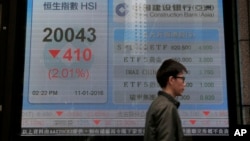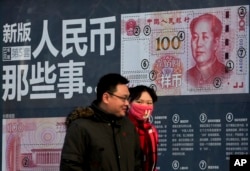A senior government official caused a stir saying that the Chinese economy will face difficulties in achieving an average 6.5 percent growth over the next five years. The remark had an impact on the stock market with the Shanghai Composite Index plunging 5.3 percent on Monday.
Li Wei, president of the State Council's Development Research Centre, said over the weekend that a growth rate of 6.5 percent is not high, but it will be very difficult to achieve this pace of growth".
Most economists expect a much lower performance. But the market was surprised to hear an official of the State Council, which is led by the Premier, saying that the official target of 6.5 percent is “very difficult to achieve”.
Questions are now being asked if China may water down its growth target. The government is due to release fourth-quarter and full-year gross domestic product figures January 19. The 2015 growth is expected to be 6.9 percent, which is the lowest in the past quarter century.
“Most economists think the potential GDP growth over five years would be much less, possibly 5.5 percent,” Xu Bin, professor of economics and finance at the China Europe International Business School, said. “But I think it is still possible to achieve 6.5 percent growth if the government can stimulate the economy, and make optimal use of resources,” he said.
Hurdles ahead
Monday’s price slide showed the market was not prepared to go along with the wishes of the China Securities Regulatory Commission, which has been taking measures to calm the volatility.
The regulator overcame its aversion to admitting mistakes when it withdrew the rule on circuit breakers on Thursday evening. This rule was cited as the reason why the stock market had to be closed down after prices fell below the stipulated 7 percent on two occasions last week.
At the Hong Kong stock exchange, the benchmark index fell below 20,000 for the first time since June 2013 as prices were down 2.8 percent.
New rule
Last Saturday, the Shanghai and Shenzhen stock exchanges came up with a new rule targeting investors who hold more than five percent of total shares of any company. They have been asked not to sell more than one percent of the concerned company's shares within three months.
The idea is to make it difficult for such investors to dump shares in big numbers as this will dive down the market. In effect, the regulators are locking in shares and restricting free trade to keep prices under check.
New concerns, new ideas
The rule comes ahead of the scheduled unlocking of $13 billion worth of shares, which is expected to begin next week. These “non-tradable shares” are mostly owned by management and promoters of listed companies.
But they were not allowed to sell the shares for one to three years. The lock-in period has now expired and these shares are ready to be sold. The government fears that an oversupply of these shares would cause high liquidity, and result in a market crash.
“The new rule that allows them to sell only one percent of the holdings is meant to avoid a market crisis,” Xu of CEIBS said.
Leslie Young, professor of economics at Cheung Kong Graduate School of Business, cites a different reason for the continuous volatility in the Chinese stock market.
“Investors are in a state of panic and they overreact to any changes that seem negative although the changes may be part of the government’s planned transition to a new economic model,” Young said.
She offers a drastic solution saying that the government should buy the stock held by retail investors. “In return, the government can give them an alternative instrument that offers a decent return, which could be indexed to the rate of GDP growth,” she said.
China also caused a bit of a surprise in the currency market when the People’s Bank of China guided the yuan to a stronger position at 6.5626 to a dollar on Monday. The move was meant to calm fears that Beijing may be triggering a currency war among Asian nations by weakening the yuan. The strengthening Yuan may have played a role in stopping the stock market from slipping further, informed sources said.





